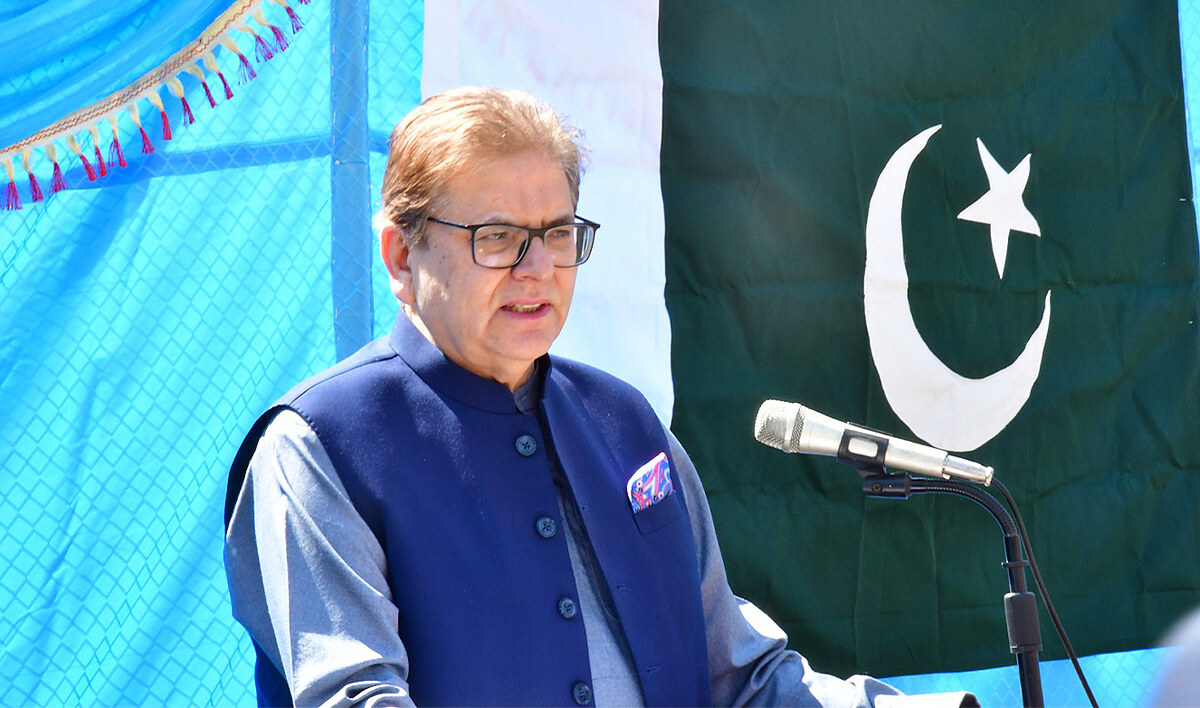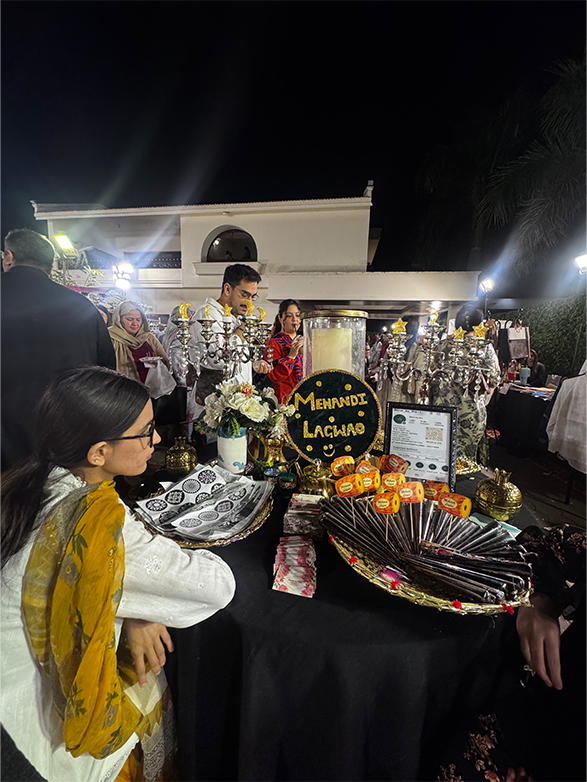KARACHI: As Pakistan got thrown another lifeline until June from the Financial Action Task Force (FATF) on Friday, a member of the government's economic advisory said it was mainly up to the parliament to act swiftly and make laws that met remaining FATF directions.
Islamabad was placed on the Paris-based terror financing watchdog’s greylist back in 2018 for its lack of adequate controls over terrorism financing. Since then, struggling with a balance of payments crisis, Pakistan was forced to turn to the International Monetary Fund for help and promised a series of measures to crack down on terrorism financing. This is the second four-month extension given to Pakistan to implement its agreed upon action plan.
“The majority of the remaining action items are related to legislations and it depends on the parliament how swiftly it acts to make laws,” Dr. Ashfaque Hassan Khan, a member of the government’s Economic Advisory Council, told Arab News on Saturday.
Pakistan was given 27 points to act on by the FATF, but on Friday, in a statement issued at the end of a week-long plenary meeting in Paris, the organization noted the country had largely addressed only 14 of those points, with varying levels of progress made on the rest of the plan.
“FATF again expresses concerns given Pakistan’s failure to complete its action plan in line with agreed timelines and in light of the TF (terrorism financing) risks emanating from the jurisdiction,” the intergovernmental body said.
The FATF also warned that failure to comply could lead to further penalties, including the country further downgraded to a blacklist. With hardly four months to go before the next FATF review, relief will be temporary with the new deadline looming over the horizon.
“They [FATF] want tangible and result oriented actions. There is seriousness on the part of the government to meet the shortcomings but they don’t have able men to handle required tasks. Neither the parliament nor government institutions can deliver due to a lack of specialised personnel to tackle all the issues,” Dr Ikram Ul Haq, a prominent Lahore-based economics expert, told Arab News.
“From legislation to enforcement, we need to work on a war-footing to meet all the requirements pointed out to us repeatedly,” he said.
A ministry of finance statement said on Friday that a strategy had been formulated and was being implemented to complete the remaining items on the FATF plan as soon as possible.
Islamabad has already amended its laws dealing with AML/TF, with harsh punishments and enhanced financial penalties. The country has also amended the Foreign Exchange Regulation Act and the Anti-Money Laundering Act-- which are now in process of being promulgated as law.
Some experts however, are downplaying the possible outcomes of another unfavourable review in June.
“There are no tangible impacts except that the country remains part of discourse worldwide,” said Dr. Waqar Masood, one of Pakistan’s former, longest serving federal secretaries of finance.
“Pakistan has made a lot of progress-- even more than its capacity,” he said, and added that strengthening the legal jurisdiction of anti- money laundering and terror financing would take time.
Ahead of the FATF Paris moot, Pakistan sentenced Lashkar-e-Taiba and Jamaat-ud-Dawa leader Hafiz Saeed to five and a half years in prison on terrorism financing charges. The move was seen as a demonstration of compliance with FATF recommendations-- but did not do enough to change the country’s status with the organization.
Compliance with remaining FATF guidelines requires ‘swift’ legislation — government advisor
https://arab.news/5x7x5
Compliance with remaining FATF guidelines requires ‘swift’ legislation — government advisor

- This is Pakistan’s second four month extension since being greylisted in 2018
- Ministry of Finance said on Friday that a strategy has been formulated and was being implemented
Pakistan charges Baloch activist with ‘terrorism’

- Mahrang Baloch staged sit-in in Quetta on Friday to demand release of members of her group allegedly detained by security forces
- Pakistan’s military strongly denies Baloch’s accusations of carrying out extrajudicial killings, enforced disappearances of Baloch persons
QUETTA: Pakistan on Sunday charged a Baloch rights activist with terrorism, sedition and murder after she led a demonstration which ended in the death of three protesters, according to police documents.
Mahrang Baloch, one of Pakistan’s most prominent human rights advocates, has long campaigned for the Baloch ethnic group, which claims it has been targeted by Islamabad with harassment and extrajudicial killings.
Pakistan’s military and the central government in Islamabad strongly refute her allegations.
Pakistan has been battling a separatist insurgency in Balochistan for decades, where militants target state forces and foreign nationals in the mineral-rich southwestern province bordering Afghanistan and Iran.
On Friday, she and other activists took part in a sit-in protest outside the University of Balochistan in the provincial capital of Quetta.
They demanded the release of members of their support group, whom they allege had been detained by security agencies.
Police launched a pre-dawn raid on Saturday, arresting Baloch and other activists, during which at least three protesters died. Both sides blamed each other for the deaths.
Mary Lawlor, the United Nations special rapporteur on human rights defenders, said she was “very concerned” at Baloch’s arrest.
Baloch and other protesters have been charged with terrorism, sedition and murder, according to the police charge sheet seen by AFP.
Hamza Shafqaat, a senior administrative official in Quetta, said that Baloch and other activists were held under public order laws.
Her lawyer, Imran Baloch, confirmed she was detained in a jail in Quetta.
Baloch was barred from traveling to the United States last year to attend a TIME magazine awards gala of “rising leaders.”
Protests among the Baloch are often led by women. Baloch, now in her 30s, began her activist career aged 16 when her father went missing in what his supporters said was an alleged “enforced disappearance.” His body was found two years later.
Earlier in March, the separatist Baloch Liberation Army (BLA) — which accuses outsiders of plundering the province’s natural resources — launched a dramatic train siege that officials said ended in around 60 deaths, half of whom were separatists behind the assault.
President Zardari confers civil awards on 69 Pakistani and foreign nationals

- Asif Zardari confers awards during investiture ceremony on Pakistan’s Republic Day
- Former PM Zulfikar Ali Bhutto posthumously awarded Nishan-e-Pakistan award
ISLAMABAD: President Asif Ali Zardari on Sunday conferred the country’s top civil awards on 69 Pakistani and foreign nationals in recognition of their services in their respective fields, the state-run Associated Press of Pakistan (APP) said.
The awards were conferred at an investiture ceremony held to mark Pakistan’s Republic Day celebrated every year on Mar. 23 in the capital city of Islamabad.
The ceremony was held at the Aiwan e Sadr or the official residence of the president, in which different personalities were decorated with civil awards in recognition of their services in health, education, literature, journalism, public, research, diplomatic matters and economy.
“President Asif Ali Zardari on Sunday conferred Pakistan’s civil awards upon 69 personalities including Pakistani nationals and foreigners in recognition of their outstanding services in various fields,” APP said.
Late former prime minister Zulfikar Ali Bhutto, who was also the founder of the Pakistan Peoples Party (PPP) led by Zardari, was posthumously awarded the Nishan-e-Pakistan award. His daughter Sanam Bhutto, Zardari’s sister-in-law, received the award on her father’s behalf.
Bhutto was hanged on April 4, 1979, in Rawalpindi District Jail, where he had been confined since his conviction on charges of conspiring to murder a political opponent. The charismatic, Western-educated leader served as the fourth president of Pakistan from 1971 to 1973, and later as the country’s ninth prime minister from 1973 to 1977.
He was ousted in a military coup by General Mohammad Zia-ul-Haq on July 5, 1977, following an election in which Bhutto is widely charged with having rigged the vote.
Legal experts have for years questioned Bhutto’s trial both in the Lahore High Court and the Supreme Court, and raised questions on the conduct and procedure of the hearings, as well as on the fact that they took place while Pakistan was under military rule. Analysts argue this is the reason Bhutto’s death penalty judgment has never been cited as a precedent in any subsequent case in Pakistan’s judicial history.
Pakistan’s top court, in a landmark verdict in March last year, admitted Bhutto did not get a fair trial.
The foreign nationals who were awarded by the president include Hyder Qurbanov and Dr. Christine Brunhilde, who received the Sitara-e-Quaid-e-Azam award, while Agostino Da Polenza and Professor Valeria Picacentini were issued the Tamgha-e-Pakistan, and Dr. Xinmin Liu was awarded the Tamgha-e-Quaid-e-Azam.
Separately, Zardari granted military awards to Military awards to the officers and soldiers of the Pakistan Army, Navy and Air Force.
These awards included two Sitara-i-Basalat, 227 Tamgha-i-Basalat, 82 Imtiazi Asnad, 185 Chief of Army Staff Commendation Cards, 23 Hilal-i-Imtiaz (Military), 112 Sitara-i-Imtiaz (Military) and 133 Tamgha-i-Imtiaz (Military) awards.
Peace in Afghanistan necessary for regional stability, says Pakistani envoy amid surging tensions

- Muhammad Sadiq Khan is on a three-day visit to Afghanistan to discuss bilateral matters amid surging militancy
- Army says 16 militants attempting to enter Pakistan via Afghanistan gunned down in North Waziristan district
ISLAMABAD: Peace and progress in Afghanistan are necessary for regional stability, Pakistan’s special envoy Muhammad Sadiq Khan said on Sunday, amid rising tensions between the neighboring countries due to militancy.
Khan, Pakistan’s special representative to Afghanistan, is on a three-day visit to the country to discuss bilateral matters with Afghan officials. His visit takes place amid tense relations between the two countries due to a mix of security, political and border issues, with Islamabad accusing the Taliban-led interim government in Kabul of providing safe haven to anti-Pakistan militant groups facilitating cross-border attacks. Kabul has denied the allegations.
The friction escalated after a recent targeting of a passenger train in Pakistan’s southwestern Balochistan province, claimed by the separatist Baloch Liberation Army (BLA). Pakistani officials said the BLA fighters remained in contact with “handlers” based in Afghanistan during the attack that lasted for two days and involved hundreds of hostages.
“Peace and progress in Afghanistan is essential for regional stability,” Khan was quoted as saying by Pakistan’s embassy in Kabul on the occasion of Pakistan’s Republic Day.
“Pakistan and Afghanistan must synergize their efforts to foster regional economic development.”

The Pakistani envoy described Afghanistan as “one of the most important regional partners” of his country, stressing the need for both to work together to enhance bilateral trade and regional connectivity.
“Pakistan remains committed to a strong and mutually beneficial bilateral relationship with Afghanistan,” Khan said.
Meanwhile, Pakistan’s military said in a statement on Sunday that it gunned down 16 militants who attempted to cross into Pakistan from Afghanistan on the night between Mar. 22-23 in the North Waziristan district.
“Pakistan has consistently been asking Interim Afghan Government to ensure effective border management on their side of the border,” the Inter-Services Public Relations (ISPR), the military’s media wing, said.
“Interim Afghan Government is expected to fulfil its obligations and deny the use of Afghan soil by Khwarij for perpetuating acts of terrorism against Pakistan.”
The ISPR said Pakistan’s security forces are committed to securing its borders and eliminating “terrorism” from the country.
Pakistan’s ties with Afghanistan were also strained after the former launched a nationwide deportation campaign targeting undocumented foreigners, mostly Afghans, in November 2023, shortly after a series of deadly suicide bombings that officials blamed on Afghan nationals.
The move, which added to diplomatic tensions between the two countries, has so far led to the repatriation of more than 800,000 Afghans. Many of them had lived in Pakistan since fleeing the Soviet invasion of their country in 1979.
The Pakistani government earlier this month also directed Afghanistan Citizen Card holders to leave the country by March 31, warning they would face deportation if they failed to comply.
In Pakistani capital, Ramadan night festival showcases over 100 small businesses

- ‘Winter Fete Suhoor and Eid Night Bazaar’ event features businesses selling home decor, food, textiles and fashion accessories
- Entrepreneurs praise festival for helping establish relationships with potential customers, building brand awareness
ISLAMABAD: A vibrant Ramadan festival held in Pakistan’s capital city Islamabad this week featured over 100 small businesses and their products ranging from handcrafted textiles to homemade food items, bringing together entrepreneurs, food lovers and eager shoppers.
The ‘Winter Fete Suhoor and Eid Night Bazaar,’ initially conceived as an annual event, has now grown into a bi-monthly tradition. It offers a vital launching pad for startups and home-based businesses to showcase their products.
The latest edition of the festival was held at founder Sabeen Abdal’s house in Islamabad on Saturday, Mar. 22, from 6:00pm to 1:30am. It featured an eclectic mix of businesses selling home decor, handcrafted textiles, food items and fashion accessories.
“We started this as an opportunity for startups who don’t have storefronts to showcase their products,” Abdal told Arab News.
“There’s a big shortage of such events in our city, so now we host an event every two months,” she explained. “Many of our vendors are women-led businesses and startups, which makes this even more special.”

Zara Nadeem, an entrepreneur whose business specializes in wardrobes and home decor, agreed. She said the festival was an opportunity for entrepreneurs such as herself to engage with potential customers.
“Events like this help us create brand awareness and consolidate our brand,” Nadeem, who recently opened her first showroom, said.
“We are trying to shift the mindset that quality only comes from imported products. We want to produce high-quality items locally in Pakistan.”

Jumana Vijlani, an entrepreneur who recently launched her fashion jewelry business, said the festival was proving to be a stepping stone for her to gain much-needed brand exposure.
“We are a new startup, and it has only been a few months since we began,” Vijlani said. “Events like these provide us with much-needed opportunities to advertise and boost our sales.”
Beyond shopping, the festival served as a lively social gathering where visitors connected with friends and family while supporting small businesses.
The food stalls were a major attraction, offering popular Ramadan treats such as dahi bhallay, chaats, and traditional teas.
Hina Raza, the owner of a home-based food business, shared how such festivals play a crucial role in motivating her to pursue her passion for cooking after leaving her teaching career.
“A year ago, I left teaching to pursue this full-time, and events like this not only help us financially but also motivate and uplift us,” Raza said.
Pakistan PM says will announce relief in electricity costs ‘soon’

- Shehbaz Sharif chairs high-level meeting on matters relating to Pakistan’s Power Division
- Pakistan’s energy sector has struggled with financial strain due to circular debt, power theft
ISLAMABAD: Pakistan’s Prime Minister Shehbaz Sharif said on Sunday he would “soon” announce a comprehensive package providing relief to the masses in terms of electricity prices, state-run media reported.
Pakistan has aggressively pursued reforms in its energy sector, which has long struggled with financial strain due to circular debt, power theft and transmission losses. These problems have led to blackouts and high electricity costs in the country.
Sharif chaired a meeting in Islamabad to review matters related to the Power Division on Sunday, state broadcaster Radio Pakistan reported.
“Prime Minister Shehbaz Sharif says a comprehensive package will be announced soon to provide relief to the public in electricity costs,” the state broadcaster said.
Sharif said his government would be able to provide more relief to the people in prices of electricity due to its recent power reforms.
He directed authorities to expedite the process of privatizing power distribution companies, urging them to resolve legal or other matters relating to the liquidation of power generation companies.
The Pakistani premier said promoting renewable energy was a “priority” of his government, clarifying that there is no change in the government’s policy on solar energy.
The clarification comes as Pakistan’s Economic Coordination Committee (ECC) earlier this month revised the buyback rate for solar net-metering electricity from Rs27 per unit to Rs10 per unit, saying the move was intended to ease the burden on grid consumers.
Pakistan has sought to ease fiscal pressure aggressively in recent months by undertaking energy reforms that reduce tariffs and slash capacity payments to independent power producers (IPPs).
The federal cabinet approved a plan in January to renegotiate agreements with 14 IPPs in its bid to lower electricity costs and address the country’s mounting circular debt.









